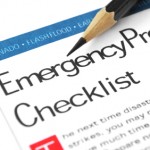With regards to surviving a fire, Sweet Brown said it the best, “I ain’t got time for that!” Ms. Brown echoes my sentiments when it comes to fire safety around the home.
 The key to surviving a disaster natural or otherwise is great planning a well-thought-out emergency preparedness plan and disaster preparedness kit could mean the difference between life and death. The first and most basic plan for survival should involve a home fire. According to the CDC (Centers for Disease Control and Prevention), deaths from fires in the third leading cause of death in the home. It only makes sense that this is the first disaster we prepare for.
The key to surviving a disaster natural or otherwise is great planning a well-thought-out emergency preparedness plan and disaster preparedness kit could mean the difference between life and death. The first and most basic plan for survival should involve a home fire. According to the CDC (Centers for Disease Control and Prevention), deaths from fires in the third leading cause of death in the home. It only makes sense that this is the first disaster we prepare for.
[amzn_product_inline asin=’B000KKHWLU’]
“A local man was burned over 90% of his body in an early morning fire”
It’s 3:09 in the morning, you’re snoozing away, dead to the world. In your mind’s ear, you hear your dog yelping. Suddenly you hear your smoke detector going off. You wake up to a room full of smoke, and you as well as your wife do everything right.
You get low, check the doors and head out, your kids have already started to head for the door, also low crawling across the carpet. Your family makes it out. After a quick head count, you realize someone is missing and run back into your now fire-engulfed home.
You’re looking for your teenaged son who at first glance appears he didn’t make it out with the rest of your brood. While searching for him, you find yourself trapped. Your next waking moments are in a burn ward.
Your son, unbeknownst to you did in fact make it out, he was sleeping in the family room when the blaze kicked off and ran out back.
How could this tragedy have been avoided?
A Disaster including a home can strike anytime. Creating an effective emergency plan is the best way you can prepare your family to cope with an unforeseen disaster. As the head of your family, it is your duty to prepare a disaster/emergency plan.
An emergency plan can be compared to life insurance. Its is just something you must have
Would your family know what to do in the event of a home fire?
In the event of an emergency such as a fire, would you know how to deal, respond and live? Would your family know what to do if you were out of town or on a date with your husband?
Now is the time to create a disaster plan and educate your family. The motto here is to “be prepared not scared.”
Stage a disaster preparedness drill in your house.
It could (should) start with a simple Fire Drill complete with an escape route(s) and meeting point. For fire, the meeting place could be the mailbox at the end of the driveway, the neighbor’s house, or the stop sign at the end of the block. Something fixed that won’t move.
“Everyone meeting at a pre-determined location will make it easy to take a head count and eliminate the need for you to run into a burning building to find someone who is already out.”
In the event of a natural disaster such as a tornado or flash flood, your rally point could be the home of a relative or friend outside of your neighborhood. This location could serve as your meeting place in the event your neighborhood is heavily damaged.
A basic emergency plan should include:
- Escape routes.
- Utility shut-off and safety(if particle)
- Insurance and vital records(I keep copies at my mom and brother’s home)
- Pet Care(Pet Rescue Stickers are a great way to let the firefighters know a pet may be inside)
A well-rehearsed disaster plan will give you peace of mind while traveling away from your family. God forbid a disaster strikes your area while you’re away, you will know in your heart your family has a great plan to make it.
Take the time today to consider an emergency/disaster plan. Take the time to be prepared, not scared.
Fire Deaths and Injuries: Prevention Tips
- Never leave food unattended on a stove.
- Keep cooking areas free of flammable objects (such as potholders and towels).
- Avoid wearing clothes with long, loose-fitting sleeves when cooking.
- Never smoke in bed or leave burning cigarettes unattended.
- Do not empty smoldering ashes in a trash can, and keep ashtrays away from upholstered furniture and curtains.
- Never place portable space heaters near flammable materials (such as drapery).
- Keep all matches and lighters out of reach of children. Store them up high, preferably in a locked cabinet.
- Install smoke alarms on every floor of the home, including the basement, and particularly near rooms in which people sleep.
- Use long-life smoke alarms with lithium-powered batteries and hush buttons, which allow persons to stop false alarms quickly. If long-life alarms are not available, use regular alarms, and replace the batteries annually.
- Test all smoke alarms every month to ensure they work properly.
- Devise a family fire escape plan and practice it every 6 months. In the plan, describe at least two different ways each family member can escape every room, and designate a safe place in front of the home for family members to meet after escaping a fire.
- If possible, install or retrofit fire sprinklers into the home.
Leave a Reply